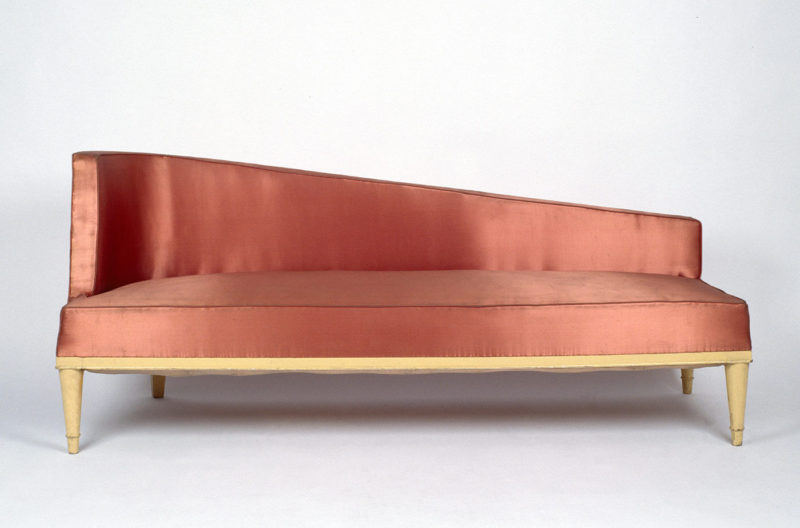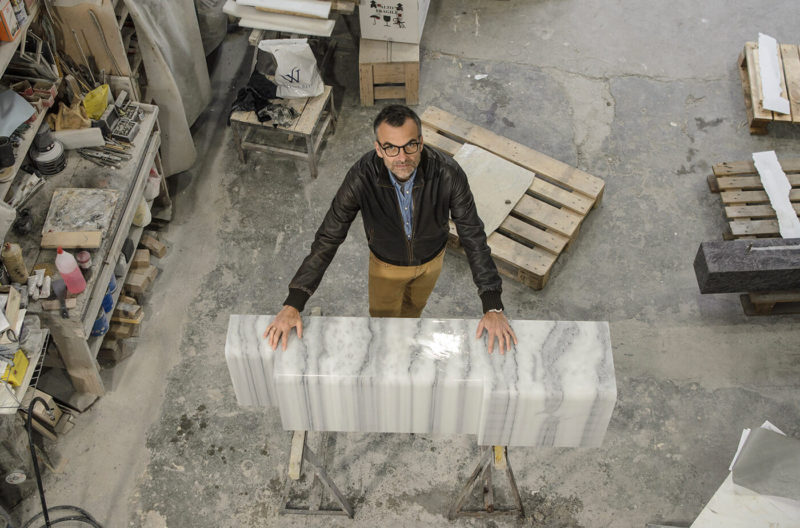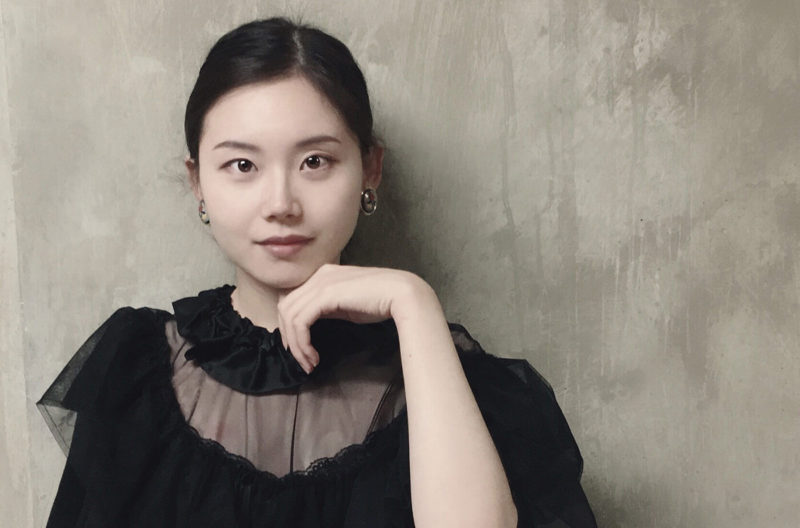Paris Dispatch / October 2022
TDE catches ‘Martin Szekely, The ’80s’ at Galerie Jousse Entreprise, and the ‘Steph Simon’ retrospective at Laffanour – Galerie Downtown.
Laffanour – Galerie Downtown: ‘Steph Simon (1956–1974) Retrospective’
Until 19th November 2022
Galerie Jousse Entreprise: ‘Martin Szekely, The ’80s’
Until 29th October 2022
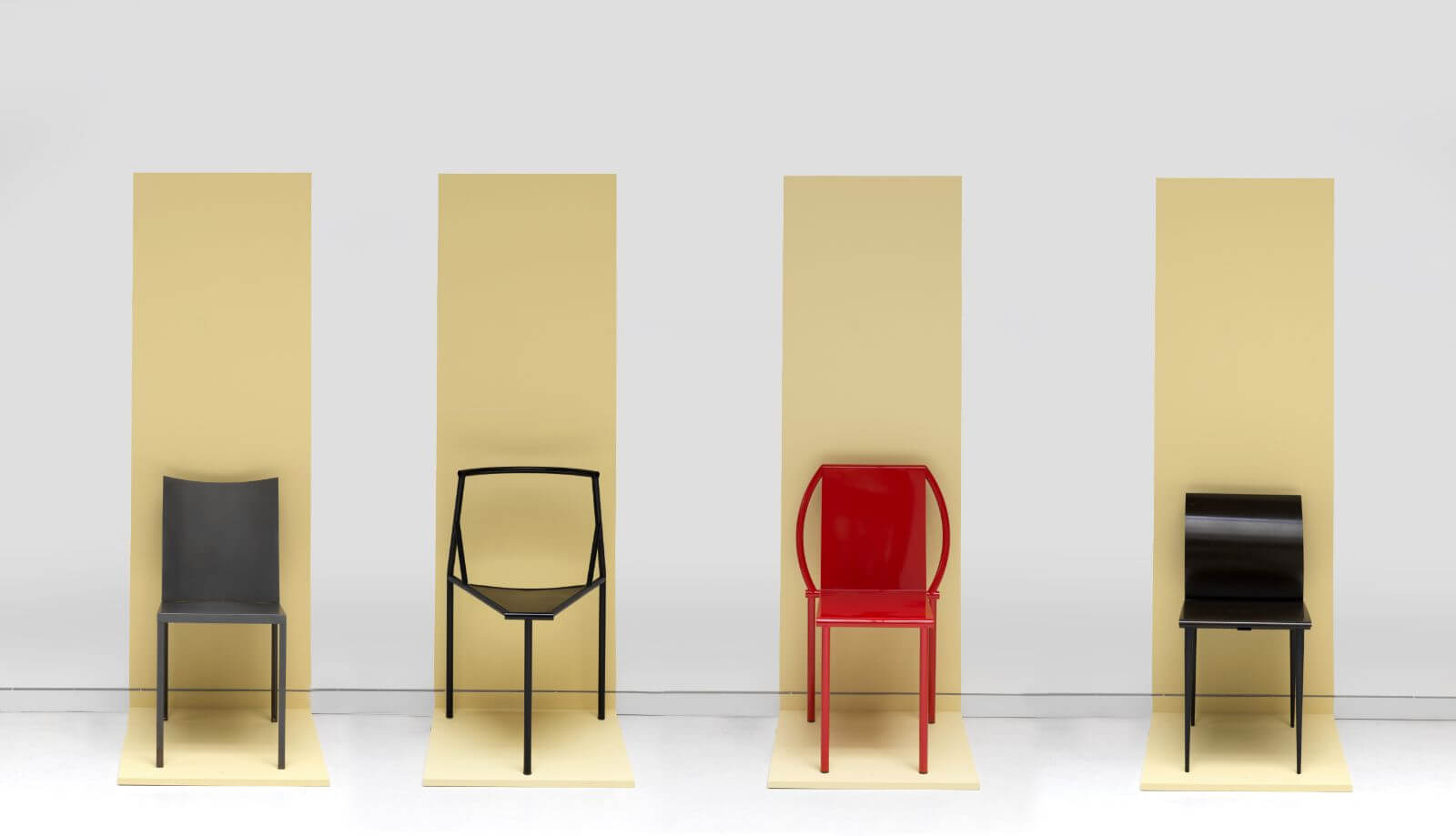
Exhibition view, ‘Martin Szekely, The 80s’ at Galerie Jousse Entreprise
COURTESY: Galerie Jousse Entreprise
TWO HISTORICALLY IMPORTANT exhibitions in Paris have recently revived bygone decades, with 1980s’ furniture designed by Martin Szekely on show at Jousse Entreprise and a retrospective of the Steph Simon gallery (which operated from 1956 to 1974) at Laffanour – Galerie Downtown. The Design Edit took a walk down memory lane, to appreciate anew the impact of those fertile decades.
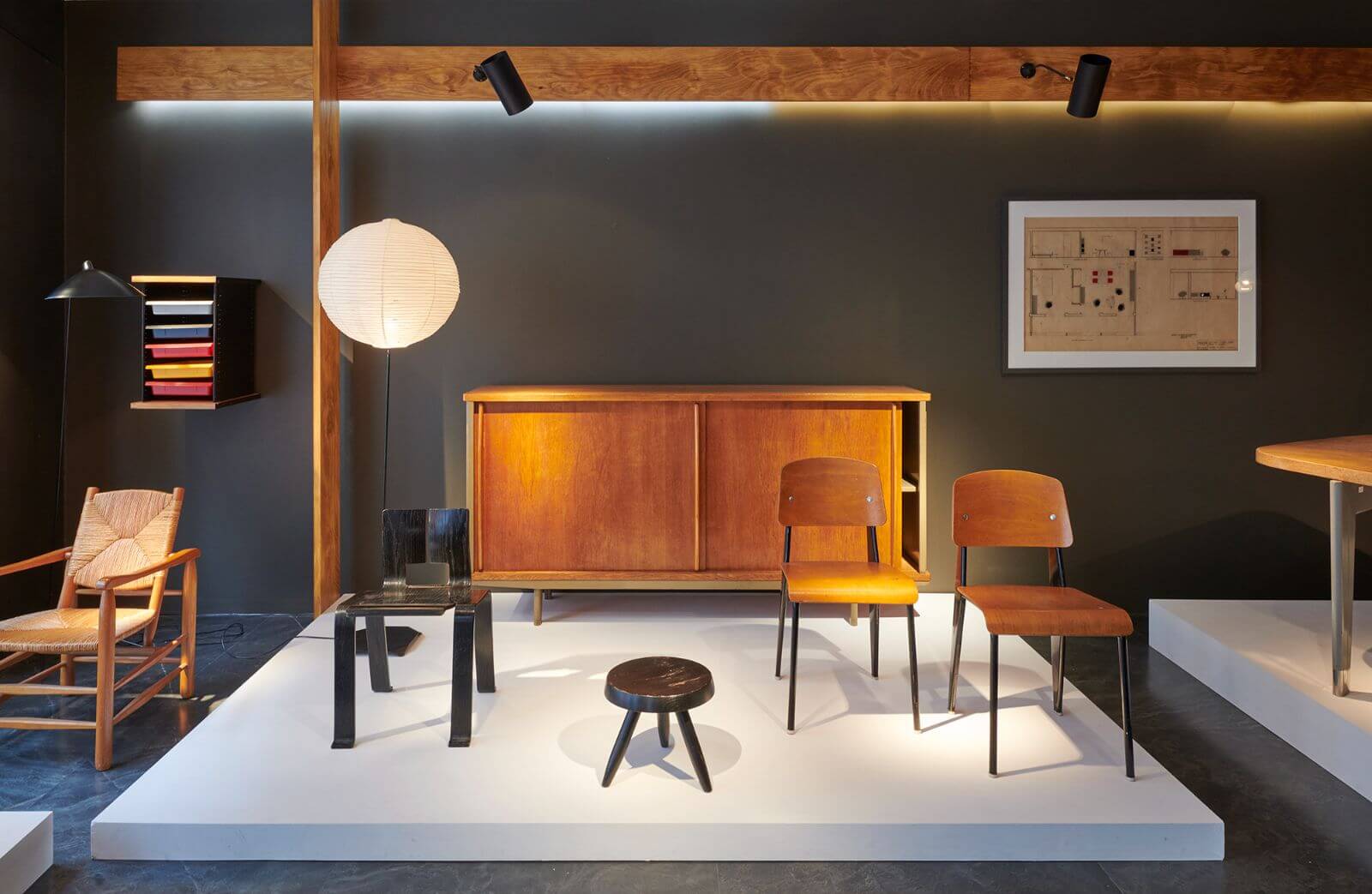
Exhibition view ‘Steph Simon Rétrospective’ at Laffanour-Galerie Downtown
COURTESY: Laffanour – Galerie Downtown
Steph Simon (1956–1974) Retrospective’ at Laffanour – Galerie Downtown
Until 19th November 2022
In 1956, Stephane Simon inaugurated his gallery, Steph Simon, in the heart of the Saint-Germain-des-Prés district. By then, he was already the licence holder of Ateliers Jean Prouvé. His aim was to champion the likes of Prouvé and Charlotte Perriand, who were engaged in reconstruction efforts after the Second World War.
Simon, who had been in the Resistance during the conflict, asked Prouvé to design his gallery’s glass front and Serge Mouille to create its lighting. Perriand was responsible for mounting exhibitions and would regularly redesign the décor. Over the years, Simon would also exhibit Isamu Noguchi, Georges Jouve and Cuban furniture before closing his gallery’s doors in 1974.
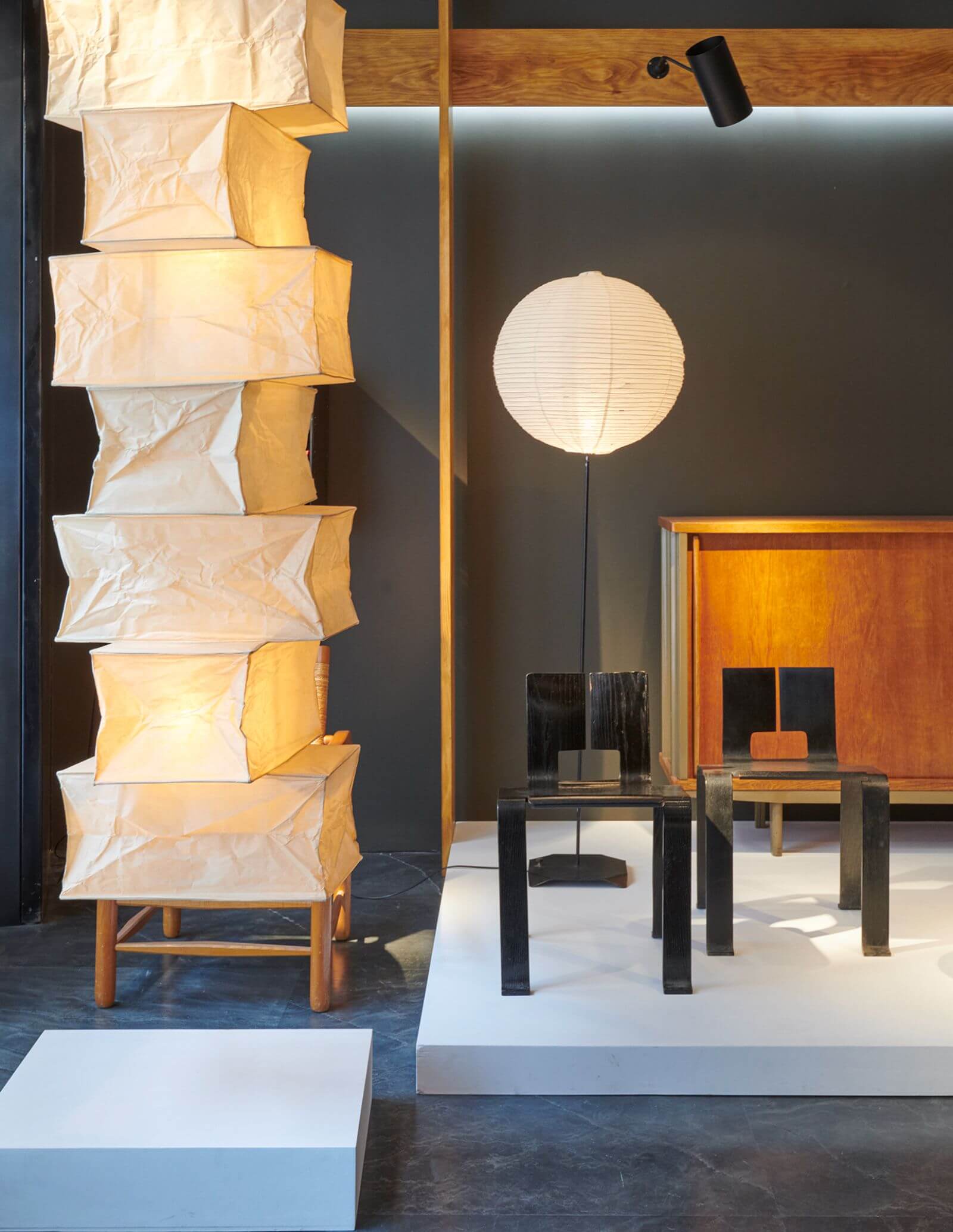
Exhibition view ‘Steph Simon Rétrospective’ at Laffanour-Galerie Downtown, with Isamu Noguchi, ‘Suspension
“Akari” n30P’, circa 1960; Jean Prouvé, ‘Bahut’, circa 1952; Serge Mouille, ‘Applique “Tuyau”
GM’, circa 1956
COURTESY: Laffanour – Galerie Downtown
In 2001, François Laffanour acquired Steph Simon’s archives, including interior design studies, photos of exhibitions, invoices and order forms. After his first retrospective show about the gallery in 2006, he is holding another this autumn. In the intervening years the market for Steph Simon’s former protégés has soared.
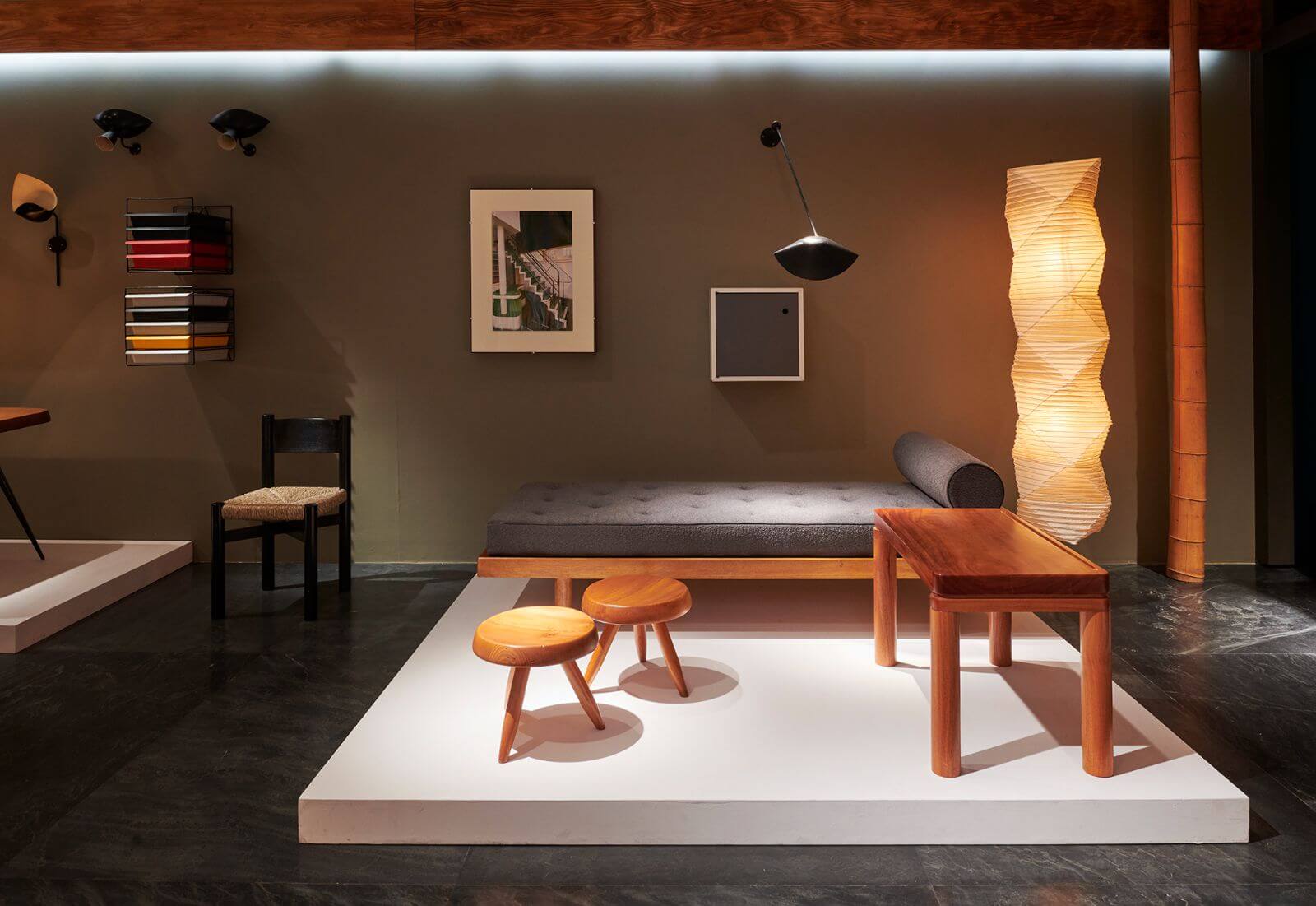
Exhibition view ‘Steph Simon Rétrospective’ at Laffanour-Galerie Downtown
COURTESY: Laffanour – Galerie Downtown
In the new exhibition, Laffanour has striven to recreate the spirit of Steph Simon. Various groupings of pieces have been brought together, such as Noguchi’s ‘Akari’ floor lamp placed next to Perriand’s ‘Brazil’ bed (circa 1959) and ‘Sandoz’ side table (1962) as well as Mouille’s lighting.
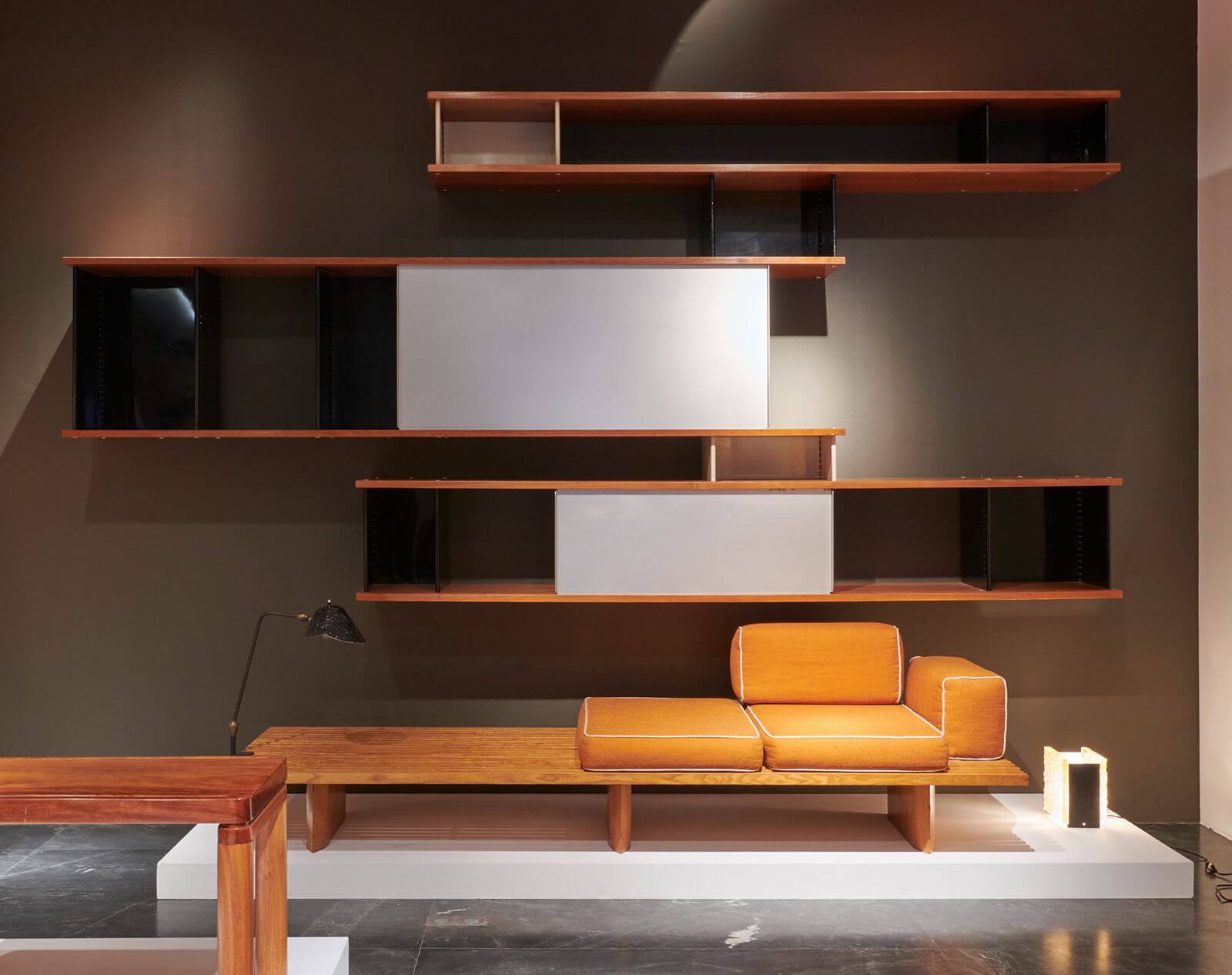
Exhibition view ‘Steph Simon Rétrospective’ at Laffanour-Galerie Downtown, with Charlotte Perriand, ‘Tokyo’ bench, circa 1954; Charlotte Perriand, ‘Sandoz’ sidetable, 1962; Charlotte Perriand. ‘Nuage’ bookcase, circa 1958; Serge Mouille, ‘Agrafée à 2 rotules’ lamp, circa 1953
COURTESY: Laffanour – Galerie Downtown
Further along, Perriand’s ‘Tokyo’ bench (circa 1954) – with orange upholstered cushions on the edge of a wooden bench – is paired with her iconic ‘Nuage’ bookcase from 1958. In another corner Prouvé’s wood-and-steel ‘Présidence’ desk and ‘Standard’ chair (1950) is on show, paired with Serge Mouille’s lighting.
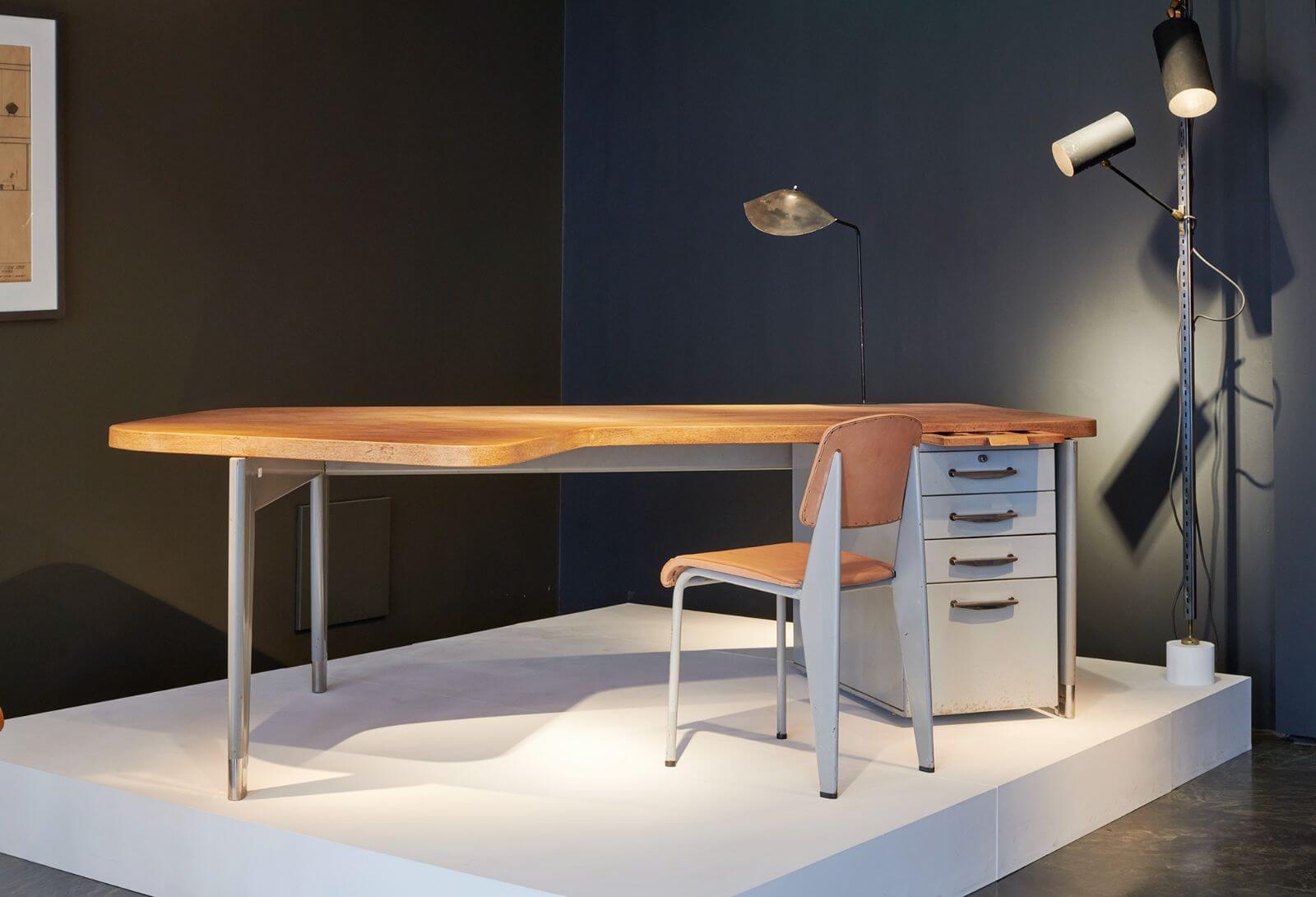
Exhibition view ‘Steph Simon Rétrospective’ at Laffanour-Galerie Downtown, with Jean Prouvé, ‘Présidence’ desk, circa 1950; Jean Prouvé, ‘Standard’ chair, circa 1950; Serge Mouille, ‘Agrafée deux rotules’ lamp, circa 1958; Serge Mouille, ‘Tuyaux’ sconces, circa 1960
COURTESY: Laffanour – Galerie Downtown
‘Martin Szekely, The ’80s’ at Galerie Jousse Entreprise
Until 29th October 2022
French designer Martin Szekely gained recognition as a rising star when he presented his ‘Pi’ chaise-longue in 1982 after receiving a carte-blanche from VIA (an organisation promoting innovation in furnishings). Founded in 1979, with support from France’s ministry of industry, VIA was keen to support emerging talent in French design. Szekely, who had studied engraving at École Estienne and cabinet-making at École Boulle, was among the early designers to benefit from the VIA platform.
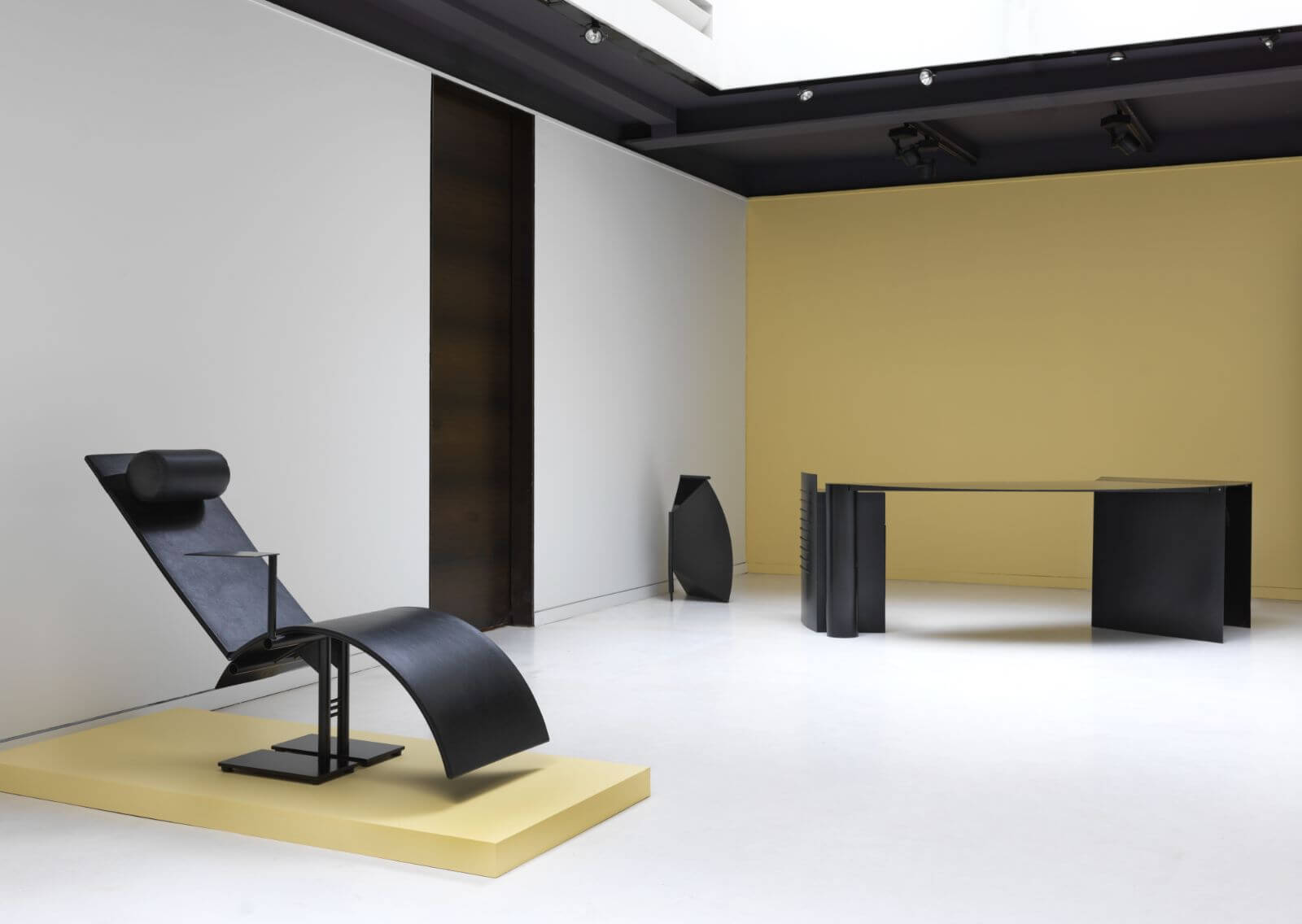
Exhibition view, ‘Martin Szekely, The 80s’ at Galerie Jousse Entreprise with ‘Pi’ chaise longue, 1982-83
COURTESY: Galerie Jousse Entreprise
Initially conceived to be realised in carbon fibre, which was Szekely’s preferred research material, the ‘Pi’ chaise-longue was finally made from steel and leather owing to technical issues. The prototype entered the collection of the Centre Pompidou. Meanwhile, art dealer Pierre Staudenmeyer and his business partner Gérard Dalmon were so enamoured by the chair’s novelty that they proclaimed it to be “néo-néo-néo tout” (neo-neo-neo everything). The duo produced Szekely’s ‘Pi’ collection of black furniture and opened a gallery, Néotù, in which to exhibit it, ushering in the new wave of 1980s’ French design.
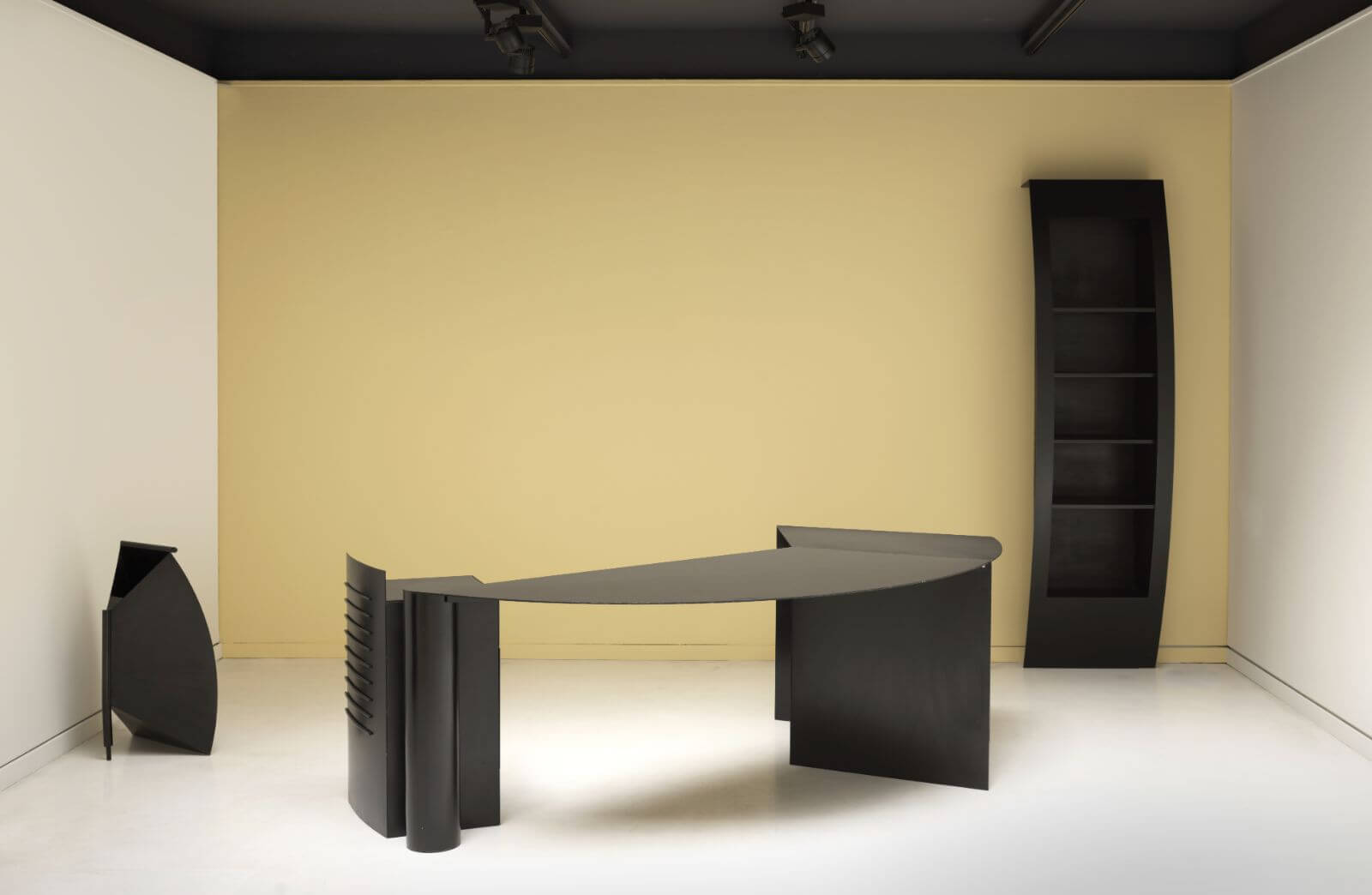
Exhibition view, ‘Martin Szekely, The 80s’ at Galerie Jousse Entreprise, with ‘Pi’ desk, 1985
COURTESY: Galerie Jousse Entreprise
Over the decades, Szekely’s ‘Pi’ collection – renowned for its graphic, minimalist interplays of geometry and industrial prowess – has become iconic. A single piece would combine squares or rectangles with ellipses and striking, sweeping lines. It is with this period that Szekely, an industrial designer, is most associated.
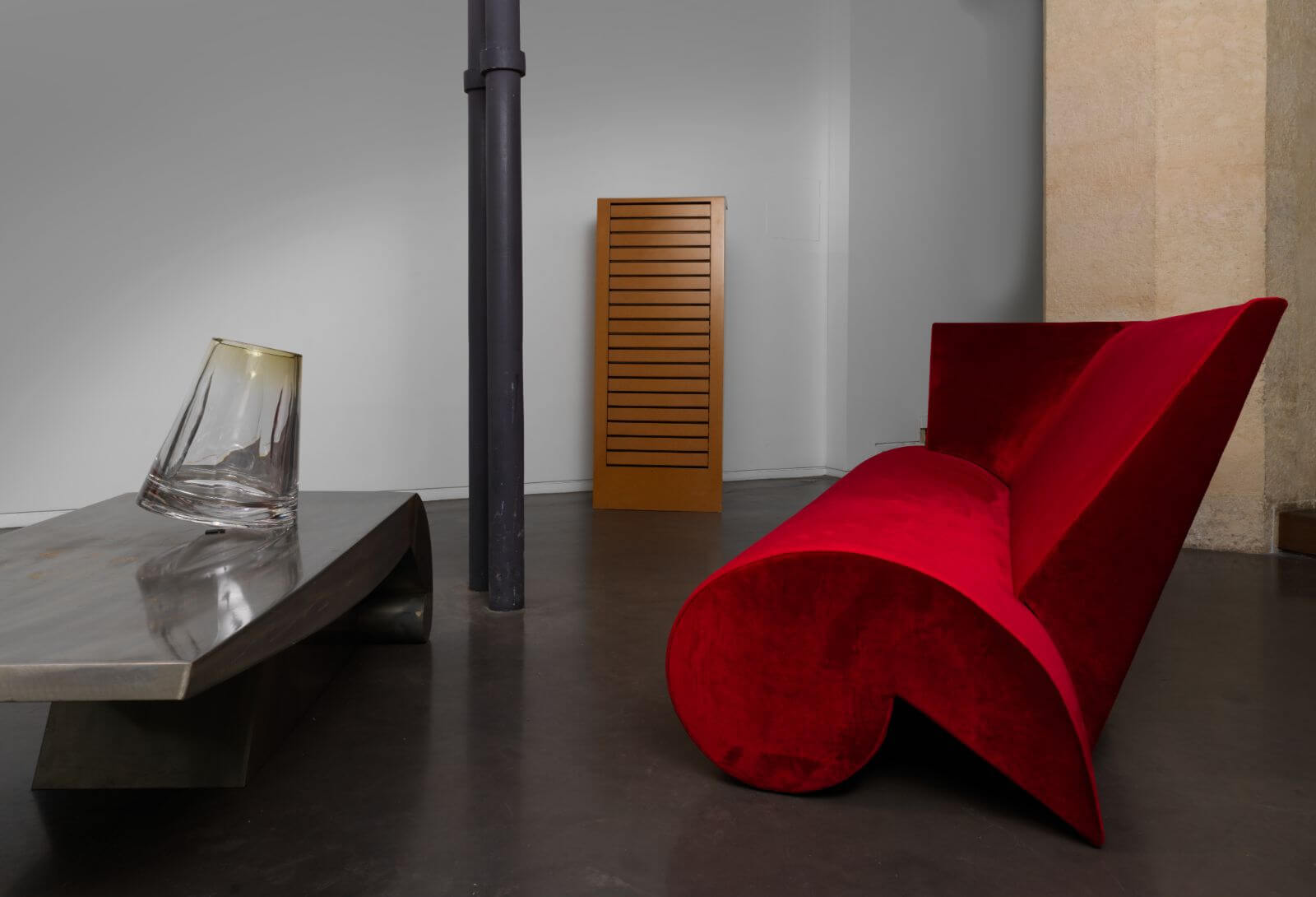
Exhibition view, ‘Martin Szekely, The 80s’ at Galerie Jousse Entreprise with ‘Stoleru’ sofa, 1987 and ‘Passif’ coffee table, 1987
COURTESY: Galerie Jousse Entreprise
A breathtaking ensemble of Szekely’s 1980s’ furniture has been on view at Jousse Entreprise on the Left Bank throughout October. The collection comprises the gradual accumulation of pieces acquired over the last decade by Matthias Jousse (MJ), son of the gallery’s founder Philippe Jousse (PJ). Among the rare pieces were prototypes and one-off commissions, such as a unique desk conceived from a captivating juxtaposition of geometric planes. Also on view was a plush red velvet ‘Stoleru’ sofa and a ‘Passif’ brushed steel coffee table, which exemplify how Szekely deployed his vision across various materials.
‘Steph Simon (1956–1974) Retrospective’ at Laffanour – Galerie Downtown.
‘Martin Szekely, The ’80s’ at Galerie Jousse Entreprise.




